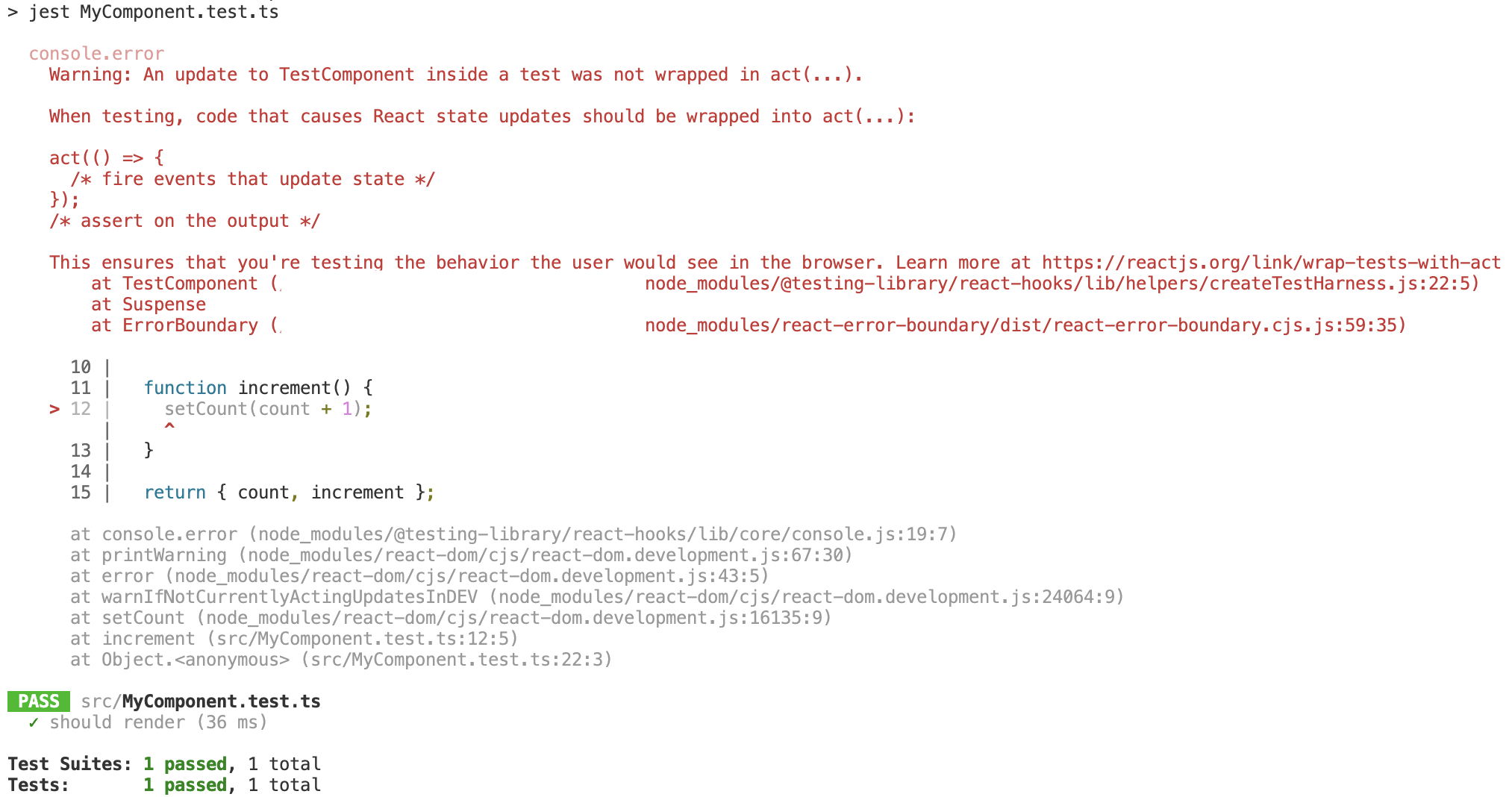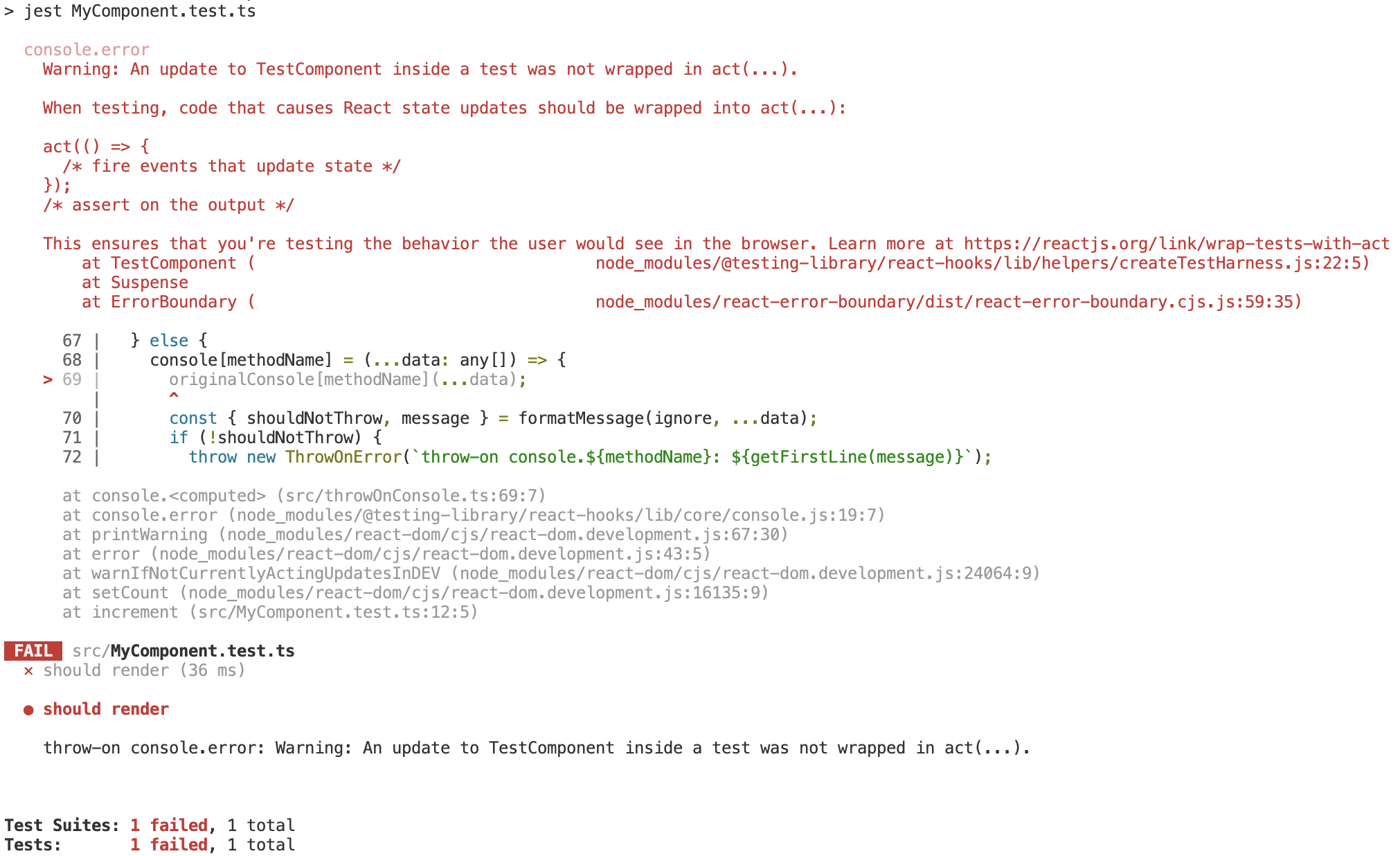Force console.error/warn and network requests to fail.
- Tiny: less than 100 lines of code
- No dependencies
- Fully tested
- Written in TypeScript
- Works with Node.js and browsers
- Generic: not specific to React or Jest
This is an alternative to https://github.com/ValentinH/jest-fail-on-console
Do you have warnings like "An update inside a test was not wrapped in act" or "Can't perform a React state update on an unmounted component" when running or testing your React app? Are your tests performing network requests when they shouldn't?
Solution: throw whenever there is a warning (e.g. console.error/warn) or a network request that isn't mocked
- The sooner a test fails, the easier it is to fix
- Improve code quality (like an ESLint rule but at run/test time)
throw-on still displays the original console message before throwing an exception with the message throw-on console.[METHOD]: [ORIGINAL_MESSAGE_SHORTEN]
Result:
npm install --save-dev throw-on
// Inside jest.setup.js (Jest setupFilesAfterEnv option) for example
import {
throwOnConsole,
throwOnFetch,
throwOnXMLHttpRequestOpen
} from 'throw-on';
throwOnConsole('assert');
throwOnConsole('error');
throwOnConsole('warn');
throwOnFetch();
throwOnXMLHttpRequestOpen();npm install throw-on
// Inside your entry file (something like index.js, app.js, pages/_app.js)
if (process.env.NODE_ENV !== 'production') { // You probably don't want this in production
const { throwOnConsole } = await import('throw-on');
throwOnConsole('assert');
throwOnConsole('error');
throwOnConsole('warn');
}
render(<MyApp />, document.getElementById('app'));Copy-paste throwOnConsole.ts and/or throwOnFetch.ts and/or throwOnXMLHttpRequestOpen.ts into your source code.
Tested with Node.js >= 14, might work with Node.js 12.
Transpilation to ES5 (via Babel for example) is needed for non-modern browsers.
type Options = {
/**
* Messages to ignore (won't throw), each message to ignore can be a substring or a regex.
*
* Empty list by default.
*/
ignore?: (string | RegExp)[];
};
type ConsoleMethodName = 'assert' | 'error' | 'warn' | 'info' | 'log' | 'dir' | 'debug';
/**
* Makes console method to throw if called.
*/
function throwOnConsole(methodName: ConsoleMethodName, options: Options = {}): void;
/**
* Restores the original console method implementation.
*/
function restoreConsole(methodName: ConsoleMethodName): void;
/**
* Makes fetch to throw if called.
*/
function throwOnFetch(): void;
/**
* Restores the original fetch implementation.
*/
function restoreFetch(): void;
/**
* Makes XMLHttpRequest.open to throw if called.
*/
function throwOnXMLHttpRequestOpen(): void;
/**
* Restores the original XMLHttpRequest.open implementation.
*/
function restoreXMLHttpRequestOpen(): void;If a console.error() is expected, then you should assert for it:
test('should log an error', () => {
const spy = jest.spyOn(console, 'error').mockImplementation();
// ...
expect(spy).toHaveBeenCalledTimes(1);
expect(spy).toHaveBeenCalledWith('your error message');
spy.mockRestore();
});-
Be careful: it adds a line to Jest stack trace, messing up the codeframe:
at console.<computed> (src/throwOnConsole.ts:69:7) <=== at console.error (node_modules/@testing-library/react-hooks/lib/core/console.js:19:7) at printWarning (node_modules/react-dom/cjs/react-dom.development.js:67:30) at error (node_modules/react-dom/cjs/react-dom.development.js:43:5) ...Use
restoreConsole()to get the original codeframe -
Be careful: the shorten exception message does not always match the original console message (because of React error boundary?)
-
Libraries that console.* exceptions 1 2 introduce an infinite loop: throw-on intercepts the console.* call and throws an exception => the library catches the exception and console.* it, ect.


